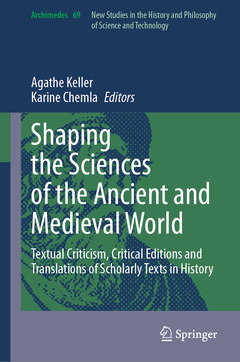Shaping the Sciences of the Ancient and Medieval World, 1st ed. 2024 Textual Criticism, Critical Editions and Translations of Scholarly Texts in History Archimedes Series, Vol. 69
Coordonnateurs : Keller Agathe, Chemla Karine

This book contributes to a worldwide history of textual criticism and critical editions of ancient scientific texts. It first looks at ancient editorial practices, and at their impact on modern editions. Contributions analyze how, through time, the perception of what a text was may have changed, and influenced how scholarly texts were made accessible. The second section looks at the historical, political and social contexts within which editions and translations of ancient scientific texts were produced. Finally, the last two parts examine the specificities of editions and translations that bore on scholarly documents. Not only is there a focus on how the elements specific to scientific texts?such as diagrams and numbers?were treated, but case studies analyzing the specific work carried out to edit mathematical and astronomical texts of the past are also offered to the reader. The scholarship displayed in this work lays the foundation for further studies on the history of critical editions and raises questions to those who make scholarly translations and critical editions today.
Chapter 1. Introduction (Karine Chemla and Agathe Keller).- Part I: Ancient Editorial and Cross-Linguistic Practices.- Chapter 2. Before the Library of Babel: On some Very Early Philologers (Piotr Michalowski).- Chapter 3. A Theory of Philological Practice in Early Modern India (Sheldon Pollock).- Part II: What was at Issue in Returning to Ancient Texts in Early Modern and Modern Times?.- Chapter 4. Rethinking the Ancient Mathematical Text: Ming-Qing Scholars’ Critical Reflections on The Gnomon of Zhou [Dynasty] (Han Qi).- Chapter 5. The Asiatic Society, the Bibliotheca Indica and Devanāgarī Pinting in Bengal: The Historical Context of the Editio Princeps of the Nyāyabhāṣya (Alessandro Graheli).- Chapter 6. Editing a Foundational Work on Classical Indian Medicine: The Printed Editions of the Carakasaṃhitā in Context (Karin Preisendanz).- Part III: Shaping Specific Features of Scientific Texts.- Chapter 7. Representing numbers and quantities in editions of mathematical cuneiform texts (Christine Proust).- Chapter 8. Numbers and Quantities in Editions of Economic and Administrative Cuneiform Texts at the beginning of the 2nd millennium BCE. The Case of the Capacity System (Cecile Michel).- Chapter 9. Reduction of Absurdity: Notes on the editorial Transformations of Greek Diagrams (Reviel Netz).- Chapter 10. Editing the Sumerians, How and Why? (Jerrold S. Cooper).- Part IV: Publishing Ancient Mathematical and Astronomical texts: Comparative Perspectives.- Chapter 11. The critical edition of the mathematical texts of Greek Antiquity: challenges and method (Micheline Decorps).- Chapter 12. Shaping a Mathematical text in Sanskrit: H. T. Colebrooke, Sudhākara Dvivedin, and Pṛthūdaka‘s commentary on the twelfth chapter of the Brāhmasphuṭasiddhānta (Agathe Keller).- Chapter 13. On the First Printed Edition of the Mathematical Book in Nine Chapters (1842) (Yiwen Zhu & Cheng Zheng).- Chapter 14. Babylonian Astronomy: Editing and Interpreting an Ancient Science (Matthieu Ossendrijver).- Chapter 15. Postface (Glenn Most).- Annexure.- Index.
Agathe Keller is senior research at the French National Center for Scientific Research (CNRS), within the SPHere (Science, Philosophy, History) research lab. Her work centers on the history of mathematics as found in Sanskrit sources, with a special focus on commentaries. She also studies the historiography of science in south Asia from the late 18th century to contemporary political discourses on traditional science in India. She has recently co-edited with K. Chemla and C. Proust, Cultures of computation and quantification in the ancient world. (Springer, 2022).
Karine Chemla, Senior Researcher at the French National Centre for Scientific Research (CNRS), research group SPHERE (Université Paris Cité & CNRS). Her work focuses, from a historical anthropology viewpoint, on the relationship between mathematics and the various cultures in the context of which it is practiced. Chemla co-edited, with Glenn Most, Mathematical Commentaries in theAncient World: A Global Perspective (Cambridge University Press, 2022); and, with A. Keller and C. Proust, Cultures of computation and quantification in the ancient world. (Springer, 2022).Date de parution : 04-2024
Ouvrage de 585 p.
15.5x23.5 cm



